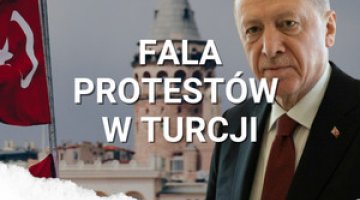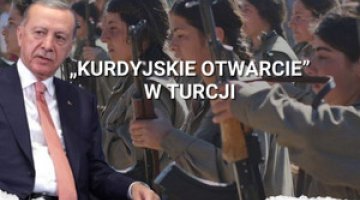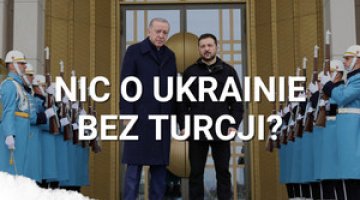Turkey after the coup: fragile national unity
Immediately after the failure of the attempted military coup on 15 July, the President of Turkey Recep Tayyip Erdoğan began a strict crackdown on its alleged organisers and moved to strengthen his own power. The state of emergency announced on 21 July may be a prelude to sealing the process, which has been ongoing for a long time, of consolidating power in the hands of the President. Currently purges on an unprecedented scale are being carried out in the state apparatus, directed at the Fethullah Gülen movement which has been accused of organising the coup attempt. At the same time, despite mass arrests in the armed forces, the authorities have promised further cooperation with the army; with regard to the ongoing conflict with the Kurdistan Workers’ Party (PKK), the army is still a key power in the Turkish state.
The current sense of national unity, which serves the interests of the government, is spontaneous in nature, and derives from the general aversion of the public towards the idea of military rule. Slowly, however, the opposition is beginning to mobilise. On one hand, President Erdoğan can count on his followers’ acquiescence to his consolidation of power, but on the other, he cannot ignore the deep divisions in Turkish society. His despotic tendencies will meet stiff resistance, and the coming months will likely see a period of very serious internal turbulence.
The state of emergency and the crackdown on the opposition
The mass purges in the state apparatus (and beyond, in private schools and businesses) in response to the failed coup have reached an unprecedented scale. More than 13,000 people have been detained or formally arrested, and over 60,000 suspended from their duties (mainly in the police, judiciary and education). The victims are mainly supporters of Fethullah Gülen, a former ally of the government. The representatives of this group have for many years been building up influence in state institutions. Since the end of 2013 Erdoğan and Gülen have been in serious conflict, and supporters of the latter are now being systematically removed from the state apparatus. The failed coup, which according to the government was inspired by Gülen, has served as an excuse to attempt to completely remove or at least disrupt his influence. Because it had been built up over many years, and the Gülen movement is a mass phenomenon, this purge is being carried out on an unprecedented scale. This will seriously affect the performance of the state apparatus.
The state of emergency introduced on 21 July should be seen as a way of sanctioning the repression which has resulted from the attempt to overthrow the government. The repression has targeted the alleged conspirators and their supporters, as well as the broader opposition as such. On the other hand, because the executive power passes de facto into the hands of the President (he has gained the right to rule by decree), Erdoğan may treat the current situation as a prelude to making a permanent change in the political system. For a long time a change of the constitution has been planned which would ensure the concentration of executive power in the hands of the President. Erdoğan is trying to show that he has the public’s acquiescence to such a consolidation of power, and ultimately, to the formalisation of his increasingly autocratic rule.
The failed coup has led to a hitherto unprecedented erosion in the public image of the army, which in the face of the ongoing conflict with the PKK and the ongoing war in Syria remains a key institution for the Turkish state. Despite the arrests of over 8000 military personnel (including 30% of the high command), the anger of the authorities is aimed not so much at the army itself, but rather at that part of it which was allegedly working with Gülen. This will remove from the army (at least partially) the stigma of having assaulted the democratic order, and does not close the door to further cooperation with the government, which has so far had little ability to influence the shape of the armed forces. However, the planed reassignment of military academies to the control of the Ministry of Education confirms that the government has such ambitions, although these will be extended over many years.
Fragile national unity
Immediately after the thwarted coup in Turkey an atmosphere of national unity prevailed. But this has a temporary nature, based on a universal aversion to military governments (the public remembers the trauma of the years 1980–3, when the military last held genuine power), and went hand in hand with the instant condemnation of the coup by all opposition parties. In the long run, however, such unity will be impossible to maintain.
The plotters’ actions were hindered by mass protests organised by Erdoğan’s supporters. For this reason, the President will portray this as a democratic mandate to formalise the nature of his power. This will lead to tensions arising from persistent and very deep social polarisation; according to opinion polls, over half of the population is against a presidential system. On 24 July, the opposition Republican People’s Party (CHP) held a rally in Istanbul’s Taksim Square, in which tens of thousands of people participated; they both condemned the coup and expressed opposition to the government’s plan to establish authoritarian rule.
In the current situation, the President is trying to maintain a dialogue with the opposition, as shown by his invitation on 25 July, together with the Prime Minister and the head of the ruling Justice and Development Party (AKP), to the leaders of the opposition CHP and the Nationalist Movement Party (MHP). However, Selahattin Demirtaş, the co-chairman of the pro-Kurdish Peoples’ Democratic Party (HDP), was excluded from these talks.
But the unity expressed at the level of the political elites is fragile, and Erdoğan’s attempts to consolidate power will most likely deepen the political conflict, as well as the public protests, which will be difficult to control, particularly as the state apparatus (especially the police and the judiciary) has been subjected to a fundamental purge.
Consequences for relations with the West
The internal dynamics in Turkey will have important consequences for the country’s relationships with the European Union and the United States. In the context of EU/Turkish relations, the authorities’ actions immediately after the coup aroused much controversy. Brussels responded to the announcement that the death penalty would be restored (which around 58% of the population supports) by threatening to break off the accession process. An even more substantial threat resulting from the serious internal turbulence is the potential collapse of the cooperation on the issue of the migration crisis. As a result of purges in the departments which oversaw the implementation of the Turkish-EU agreement, it cannot be ruled out that the Turkish authorities will lose control of the hitherto controlled mass migration of refugees to Europe.
Meanwhile, relations with the United States will experience very severe tensions in connection with Ankara’s requests for the extradition of Fethullah Gülen, who lives in Pennsylvania. Together with American support for the Syrian Kurds (whom Turkey considers a branch of the PKK), this is another axis of the dispute between Ankara and Washington. These tensions were expressed by power supplies to the US base in Incirlik being cut off immediately after the coup. If these tensions escalate, Turkish/American cooperation in the fight against the Islamic State will be called into question.
Immediately after the failure of the attempted military coup on 15 July, the President of Turkey Recep Tayyip Erdoğan began a strict crackdown on its alleged organisers and moved to strengthen his own power. The state of emergency announced on 21 July may be a prelude to sealing the process, which has been ongoing for a long time, of consolidating power in the hands of the President. Currently purges on an unprecedented scale are being carried out in the state apparatus, directed at the Fethullah Gülen movement which has been accused of organising the coup attempt. At the same time, despite mass arrests in the armed forces, the authorities have promised further cooperation with the army; with regard to the ongoing conflict with the Kurdistan Workers’ Party (PKK), the army is still a key power in the Turkish state.
The current sense of national unity, which serves the interests of the government, is spontaneous in nature, and derives from the general aversion of the public towards the idea of military rule. Slowly, however, the opposition is beginning to mobilise. On one hand, President Erdoğan can count on his followers’ acquiescence to his consolidation of power, but on the other, he cannot ignore the deep divisions in Turkish society. His despotic tendencies will meet stiff resistance, and the coming months will likely see a period of very serious internal turbulence.




